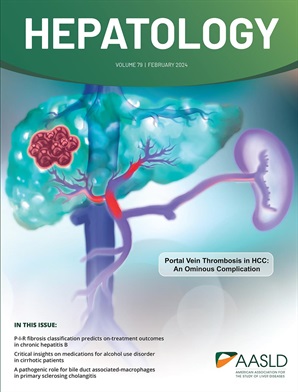Pilot trials of oral betaine in participants with non-alcoholic fatty liver disease and elevated alanine aminotransferase.
IF 15.8
1区 医学
Q1 GASTROENTEROLOGY & HEPATOLOGY
引用次数: 0
Abstract
BACKGROUND/AIM Betaine, 20 grams/day for 12 months, reduced liver injury in several trials in non-alcoholic steatohepatitis (NASH). Our aim was to determine the safety and efficacy of lower doses of betaine in clinically diagnosed metabolic dysfunction-associated steatotic liver disease (MASLD) and an elevated ALT. METHODS We performed three pilot trials in participants with clinically diagnosed non-cirrhotic MASLD and ALT ≥50 U/L. In the first trial, 44 participants were randomized to 4 g or 8 g daily for 12 weeks. In the second trial 10 participants received 1 g/d for 24 weeks while 16 participants received 2 g/d for 24 weeks in the third trial. Primary outcome was percent decline in abnormal component of ALT (ie, ALT >30 for males or >25 for females). Other outcomes included improvement in absolute ALT and AST, and other serologic tests of liver injury, including metabolomics-advanced steatohepatitis fibrosis (MASEF) score, cytokeratin 18, and pro-C3. Baseline and end of treatment data were compared with a paired t-test. RESULTS At baseline, more than 75% of participants had NASH when tested by MASEF score. ALT, AST, cytokeratin 18, pro-C3, and MASEF score decreased significantly among participants receiving 8 g, 4 g, 2 g, but not 1 g. High density lipoprotein increased in the 4 g and 2 g cohorts; low density lipoprotein did not change. Approximately 35% reported mild, transient gastrointestinal symptoms. CONCLUSION Betaine 8 g/d, 4 g/d, and 2 g/d for 12-24 weeks significantly reduced ALT and other serologic markers of liver injury among participants with clinically defined MASLD and an elevated ALT.口服甜菜碱在非酒精性脂肪肝和谷丙转氨酶升高患者中的试点试验
在一些非酒精性脂肪性肝炎(NASH)的试验中,甜菜碱20克/天,持续12个月,可减轻肝损伤。我们的目的是确定低剂量甜菜碱治疗临床诊断为代谢功能障碍相关脂肪变性肝病(MASLD)和ALT升高的安全性和有效性。方法我们在临床诊断为非肝硬化MASLD且ALT≥50 U/L的参与者中进行了三项试点试验。在第一项试验中,44名参与者被随机分为每天4克或8克,持续12周。在第二次试验中,10名参与者每天服用1 g,持续24周,而在第三次试验中,16名参与者每天服用2 g,持续24周。主要终点是ALT异常成分下降的百分比(即男性ALT为bb30,女性为bb25)。其他结果包括绝对ALT和AST的改善,以及肝损伤的其他血清学测试,包括代谢组学-晚期脂肪性肝炎纤维化(MASEF)评分,细胞角蛋白18和前c3。基线和治疗结束数据采用配对t检验进行比较。结果在基线时,超过75%的参与者在MASEF评分测试时患有NASH。ALT、AST、细胞角蛋白18、前c3和MASEF评分在服用8 g、4 g、2 g而不是1 g的参与者中显著下降。高密度脂蛋白在4 g和2 g组中增加;低密度脂蛋白无明显变化。约35%的患者报告有轻微的短暂性胃肠道症状。结论甜菜碱8 g/d、4 g/d和2 g/d治疗12-24周可显著降低临床定义为MASLD且ALT升高的受试者的ALT和其他肝损伤血清学指标。
本文章由计算机程序翻译,如有差异,请以英文原文为准。
求助全文
约1分钟内获得全文
求助全文
来源期刊

Hepatology
医学-胃肠肝病学
CiteScore
27.50
自引率
3.70%
发文量
609
审稿时长
1 months
期刊介绍:
HEPATOLOGY is recognized as the leading publication in the field of liver disease. It features original, peer-reviewed articles covering various aspects of liver structure, function, and disease. The journal's distinguished Editorial Board carefully selects the best articles each month, focusing on topics including immunology, chronic hepatitis, viral hepatitis, cirrhosis, genetic and metabolic liver diseases, liver cancer, and drug metabolism.
 求助内容:
求助内容: 应助结果提醒方式:
应助结果提醒方式:


